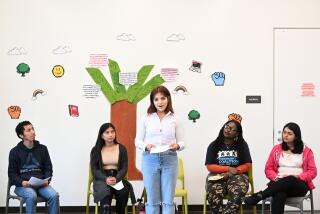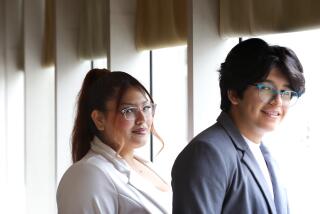EAST LOS ANGELES : A New Tonic for At-Risk Students
- Share via
Students at three schools are gearing up for an intense educational program aimed at steering them toward careers in medicine--something they may have deemed impossible.
The Junior National Health Service Corps and Junior Health Careers Opportunity Program have selected a total of 40 students at Stevenson Junior High, Roosevelt High and Bravo Medical Magnet School to receive after-school tutoring, advice from mentors, special field trips, and a summer academy and work program. It is being run by the Community Health Foundation of East Los Angeles and the USC School of Medicine.
The program is one of 10 in the country, and one of two in California, funded by the U.S. Department of Health and Human Services, which awarded a $126,000, three-year grant last October.
The students are chosen on the basis of academic, economic and social need. They are all at high risk of dropping out of school if they do not receive special attention now, program coordinator Carlos Venegas said.
“We select those most in need who we think will benefit from our program,” Venegas said. “There are many barriers that these students have to overcome.
“Our students have not gone into the health care professions because they have a limited idea of what it is. Outside of being a doctor or a nurse, there are 160 other occupations in the health care field. There has not been enough support for our young people to pursue a health career.”
The students will meet twice a week for tutoring in math, science and writing. Speakers will be brought in to talk about how they made it through high school and college and decided on a medical career.
“This is an opportunity for them to look at health careers as a choice, and we hope that they come back to their community as primary health care providers,” Venegas said.
Medical students will volunteer to meet with high school students and premed students will meet with the junior high students to help them get through problems in school and to envision a life as a health care worker. Parents will be kept informed of their children’s progress in the program and, although these schools have a high transiency rate, the progress of the students who remain at these schools and in the program will be tracked, Venegas said.
“What we talk about a lot is delayed gratification,” said Althea Alexander, assistant dean of minority student affairs at the USC School of Medicine. “They’ll have to give up a few Saturdays, or if they’re interested in athletics, we have to talk about what are their chances of making it to the NFL. We have to think of the long range and what’s important.”
The students will be taken to universities and colleges, museums, and other sites that focus on health and science. In the summer, they will enroll in a science academy that will expand on what they have learned in school.
The summer sessions will include morning classes. In the afternoons, the students will work in medical clinics and hospitals in the East Los Angeles area to get a close-up look at how doctors, nurses, X-ray technicians, laboratory workers and others work. They will be paid for their eight-hour summer days.
“They will see people like themselves and say, ‘Wow, I can do it,’ ” Alexander said.
More to Read
Sign up for Essential California
The most important California stories and recommendations in your inbox every morning.
You may occasionally receive promotional content from the Los Angeles Times.













